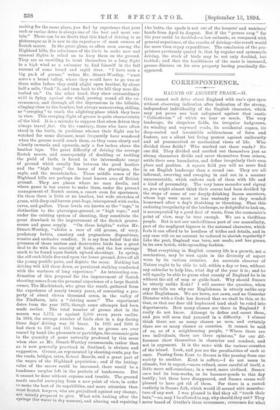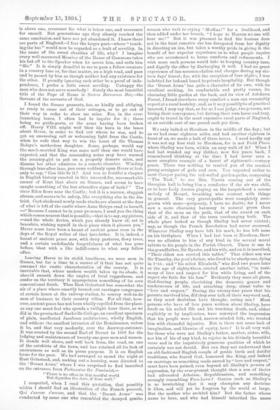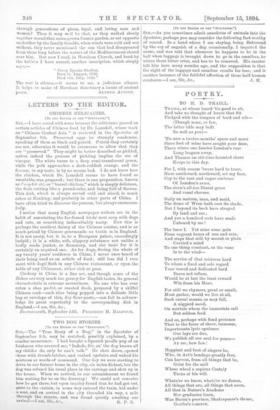CORRESPONDENCE.
HAUNTS OF ANCIENT PEACE.—II.
ONE cannot well drive about England with one's eyes open' without observing indication after indication of the strong,.
independent individuality of the English character, which may yet prove our best safeguard against that exotic " Collectivism" of which we hear so much. The very landscape, its shapeless fields, its irregular hedgerows, its winding and wayward roads, its accidental copses, its deep-seated and irresistible arbitrariness of form and feature, are a silent but living protest against uniformity and all preconceived or mechanical views of life. Who- divided these fields ? Who marked out these roads ? No one did. They divided and marked out themselves just as• strong characters divide and sever themselves from others, settle their own boundaries, and define irregularly their own, place and position. A square field you will no more find in an English landscape than a round one. They are all* informal, swerving and sweeping in and out in a manner unaccountable, which endows each of them with life and a• kind of personality. The very lanes meander and zigzag: so, you might almost think their course had been decided by the steps of some of our deeply-drinking Saxon ancestors, whose legs were more or less unsteady as they wended' homeward after a day's thatching or threshing. That this,• enduring irregularity of the landscape, so delightful to look on, is accompanied by a good deal of waste, from the economist's. point of view, may be true enough. We are a thriftless- people. But is not our unthriftiness part of our masculinity, part of the negligent bigness in the national character, which. feels it can afford to be heedless of trifles and details, and in any case will on no account be reduced to slavish regularity P•' Like the poet, England was born, not made, and has grown. in its own lavish, wide-spreading fashion.
That everything in English country life is a growth, not a. mechanism, may be seen again in the diversity of aspect worn by its various counties. An accurate observer of Nature ought to be able to tell, within a day or two, without any calendar to help him, what day of the year it is ; and he will equally be able to guess what county of England he is in without the aid of map or guide-book. Why should Sussex be utterly unlike Kent P I will answer the question, when, any one tells me why one Englishman is utterly unlike any other Englishman. We are hewn, not sawn, and no Consular Dictator with a Code has decreed that we shall be this, or do- that, or that our dear old haphazard land shall be ruled into. departments. How many classes are there in England P I really do not know. Attempt to define and count them,. and you will soon find yourself in a difficulty. I almost. think there are as many classes as men, and certainly there are as many classes as counties. It cannot be said) of us, as of a neighbouring people, " Where there are two individuals, there are three opinions," for our dif- ferences show themselves in character and conduct, and not in argument. It is the same with the various counties, of the island. Look, and you see the peculiarities of each at, once. Passing from Kent to Sussex is like passing from one- society to another. Kent is softer,—I do not mean in climate, but in aspect,—more refined, more careful of itself, a little more self-conscious; in a word, more civilised. Sussex once bad its iron-works, as its hammer-ponds to this day testify ; but these have disappeared, and Sussex seems well pleased to have got rid of them. For there is a rooted rusticity in Sussex folk, which would ill accord with manufac- ture of any sort. I was pleased to find they all " touch their hats,"—as, may I be allowed to say, why should they not P They never heard of Goethe's three reverences; reverence for what is above one, reverence for what is below one, and reverence for oneself. But generations ago they silently reached the same conclusion, and have not yet abandoned it. I know there Are parts of England—I fear the larger part--where'" touch- ing the hat " would now be regarded as a trait of servility. In the name of the sweet charities of life, why P I imagine -every well-mannered Member of the House of Commons takes his hat off to the Speaker when he meets him, and calls him Sir." It is simply dreadful to me to pass a fellow-creature in a country lane or, for that matter, on a high road, and pass and be passed by him as though neither had any existence for the other. If proudly ignoring each other be a proof of inde- pendence, I prefer a little sweet servility. Unhappy the man who does not serve somebody ! Sorely the most beautiful title of the Pope of Rome is Servos Servorum, Det,—the Servant of the servants of God.
I found the Sussex peasants, too, so kindly and obliging, so ready to come out of their cottages, or to go out of their way in order to show me mine. For, in the ever- branching lanes, I often had to inquire for it ; there being no guide-posts, or the arms having been broken -off. Henry VIII. might well blow his horn in the lanes About Hever, in order to find out where he was, and to get an answering call or welcoming light from the Castle, when he rode that way to win the heart of Sir Thomas Boleyn's motherless daughter. Some, perhaps, would say the much-married King was more naïf than one would have -expected, and that the resounding notes may have warned the country-girl to put on a properly demure mien, and .dismiss her other admirers to a remote chamber. Winding through lane after lane, you come suddenly upon Hever at last, -only to say, " Can this be it ? And was so fruitful a chapter • in English history enacted in this uncared-for, unremarkable -corner of Kent that abuts on Sussex, and seems to have -caught something of the less attractive signs of both P" The 'river Eden flows near the Castle; but it is a narrow, sluggish stream, and seems to be asleep, like everything else in the dis- trict. Cart-sheds and newly-made stacks are almost at the door of what is left of the castle where Anne Boleyn read to herself, --" Because I cannot be in your presence, I send you the thing -which comes nearest that is possible,—that is to say, my picture, rand the whole device, which you already know of, set in -bracelets, wishing myself in their place when it pleases you." Hever must have been a haunt of ancient peace even in the -days of the Royal writer of that love-letter. It is, indeed, a haunt of ancient peace now, with dewy pastures, dewy trees, and a certain undefinable forgetfulness of what has gone before, blest with a like indifference to what may follow -after.
Leaving Hever to its stolid loneliness, we were soon in -Sussex, but for a time in a corner of it that has not quite -assumed the rustic characteristics of the county. It is 'inevitable that, where modern wealth takes up its abode, it • should smooth down the angles of local ruggedness, and -confer on the territory it appropriates something of its own -conventional finish. Thus East Grinstead has somewhat the air of a place where smartly turned-out carriages congregate At certain hours at the railway-station, to convey well-to-do men of business to their country villas. For all that, how- ever, ancient peace has not been wholly expelled from the place, as any one must feel who spends a twilight hour there, as we • did in the precincts of Sackville College, an excellent specimen -of plain, unaffected Jacobean architecture, wholly English, • and without the smallest intrusion of the Renaissance, unless -it be, and that very modestly, over the doorway-entrance. It was erected by the second Earl of Dorset in 1608 for the lodging and maintenance of twenty-one poor men and women. It stands well above, and well back from, the road, on one of the outskirts of the town, and has retained all its look of ancientness as well as its pious purpose. It is an English -home for the poor. We ha•i arranged to spend the tight at East Grinstead, and, seeking out a hostelry, were directed to -the 'Dorset Arms,' where I was surprised to find inscribed -on the entrance, from Portunatue the Pessimist,— " There is no office in this needful world But dignifies the doer, if done well."
I suspected, when I read this quotation, that possibly within I should find an illustration of the French proverb, (jai ?exam ectecicee, and that the Dorset Arms' was conducted by some one who resembled the decayed gentle- woman who took to crying " Muffins ! " for a livelihood, and then added under her breath, " I hope to Heaven no one will hear me ! " Bat it was pleasant to find the hostess does not in the least conceive she has derogated from her dignity in directing an inn, but takes a worthy pride in giving it the benefit of her superior experience as to what people require who are accustomed to home comforts and refinements. I wish more such persons would take to keeping country inns, and dignify the office by discharging it well. I had no great experience of inn-accommodation and charges during my six- teen days' travel; for, with the exception of four nights, I was indebted for bed and board to private hospitality. But though the 'Dorset Arms' has quite a character of its own, with its excellent cooking, its comfortable and pretty rooms, its charming little garden at the back, and its view of Ashdown Forest, I found elsewhere every comfort a man can reasonably expect at a rural hostelry ; and, as it may possibly be of practical interest, I may say that, as far as I can judge, two persons, not hiring their conveyance, but driving their own horse and trap, ought to travel in the most expensive rural parts of England, at an outside cost of one pound each per diem.
We only baited at Horsham in the middle of the day ; but as we had come eighteen miles, and had another eighteen in front of us, we made a halt of three hours. I need hardly say it was not my first visit to Horsham, for is not Field Place, where Shelley was born, within an easy walk of it P When I had last wended my way thither, now five years back, I remembered thinking at the time I had never seen a more complete example of a haunt of eighteenth - century peace. There was nothing to remind you of the musical young exraigner of gods and men. You expected rather to meet Cowper pacing the red-walled garden-paths, composing " The Task," to see Mrs. Unwin coming out of the Georgian hall to bring him a comforter if the air was chill, or to hear Lady Austell playing on the harpsichord a serene melody of Mozart, breathing wise content with things in general. The very gravel-paths were completely over- grown with moss—purposely, I have no doubt; for I never saw a more charming harmony in natural green than that of the moss on the path, that of the sward on each side of it, and that of the trees overhanging both. The whole place looked as though Shelley had never existed ; nay, as though the French Revolution had never occurred. Wherever Shelley may have left his mark, he has left none on his birthplace. When I had last been at Horsham, there was no allusion to him of any kind in the several mural tablets to his people in the Parish Church. There is one to the grandfather, Sir Bysshe, and his wife, and on it is inscribed, "Their eldest son erected this tablet." That eldest son was Sir Timothy, the poet's father, who lived to be ninety-one, dying in 1,44 ; and " his relict Elizabeth," who died two years later at the age of eighty-three, erected another tablet, " in testi- mony of love and respect for him while living, and of the regret she feels for his loss." Evidently they were all pious, God-fearing people, cherishing the domestic graces and tendernesses of life, and attaching deep, silent value to "love and respect." During the twenty-two years that his parents survived him, did they ever talk of their wayward and, as they must doubtless have thought, erring son ? Most persons who have of late years written about Shelley, have dwelt on his exiled life and his touching death, and, either explicitly or by implication, have conveyed the impression that his people were hard, narrow-minded folk, who treated him with shameful injustice. But is there not some lack of imagination, and likewise of equity, here P It is all very well for those who were not Shelley's father, mother, sister, wife, nor kin of his of any kind, to rejoice in his divinely beautiful verse and in the impulsively generous qualities of which he certainly wa•s not devoid. But can they not understand that an old-fashioned English couple of gentle birth and dutiful traditions, who feared God, honoured the King, and looked on marriage as something made sacred by " love and respect," must have been pained, even beyond all Shelley's powers of expression, by the ever-present thought that a son of theirs bad advocated Atheism, Republicanism, and something strongly resembling Free-Love ? Genius such as Shelley's is so bewitching that it may champion any doctrine it likes, and will yet be forgiven by the world at large. But the mother who suekled him P But the father whose name be bore, and who had himself inherited the name through generations of pious, loyal, and loving men and women ? Thus it may well be that, as they walked slowly together round that moss-grown Sussex garden, or sat opposite each other by the family fireside, when winds were cold and wet without, they never mentioned the son that had disappeared from them long before the waters of the Mediterranean closed over him. But now I read, in Horsham Church, and hard-by the tab?ets I have named, another inscription, which simply says,— " Percy Bysshe Shelley, Born iv. August, 1792. Died viii. July, 1622."
is silence,—it seems to me, a judicious silence. to make of Horsham Sanctuary a haunt of ancient The rest It helps peace.
ALFRED AUSTIN.




































 Previous page
Previous page